外研版(2019)Unit 2 Exploring English(Grammar)课件50张PPT
文档属性
| 名称 | 外研版(2019)Unit 2 Exploring English(Grammar)课件50张PPT |
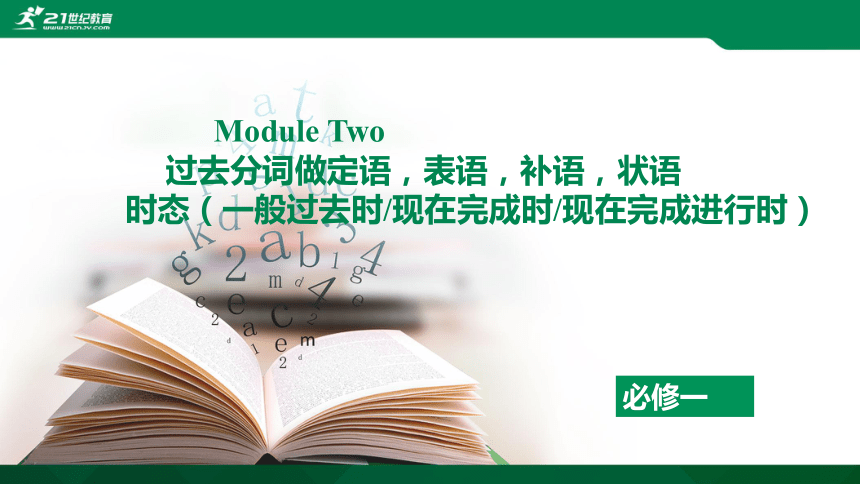
|
|
| 格式 | zip | ||
| 文件大小 | 2.9MB | ||
| 资源类型 | 试卷 | ||
| 版本资源 | 外研版(2019) | ||
| 科目 | 英语 | ||
| 更新时间 | 2020-07-27 00:00:00 | ||
图片预览

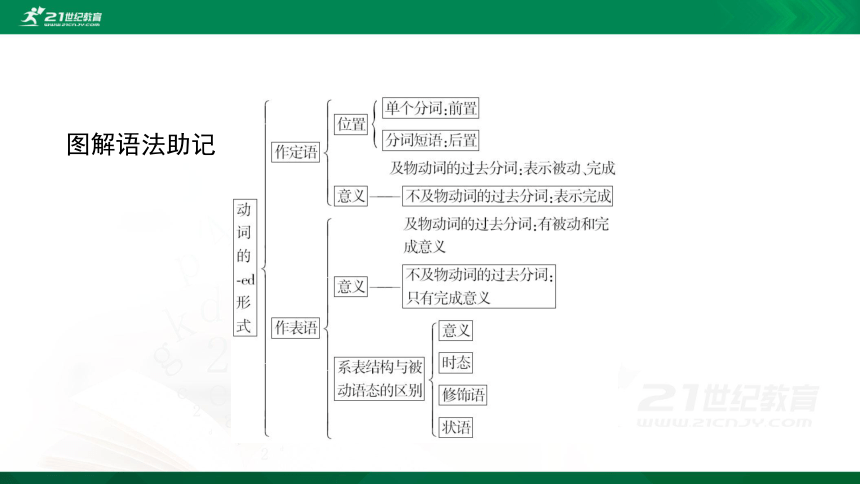
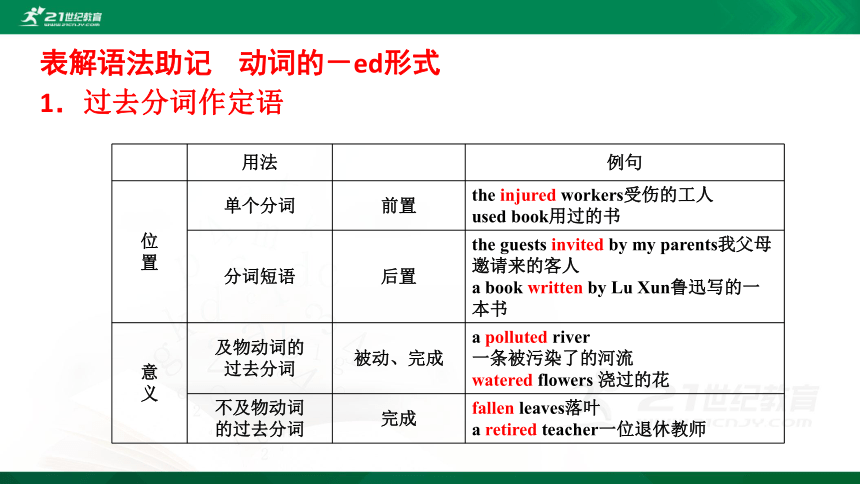
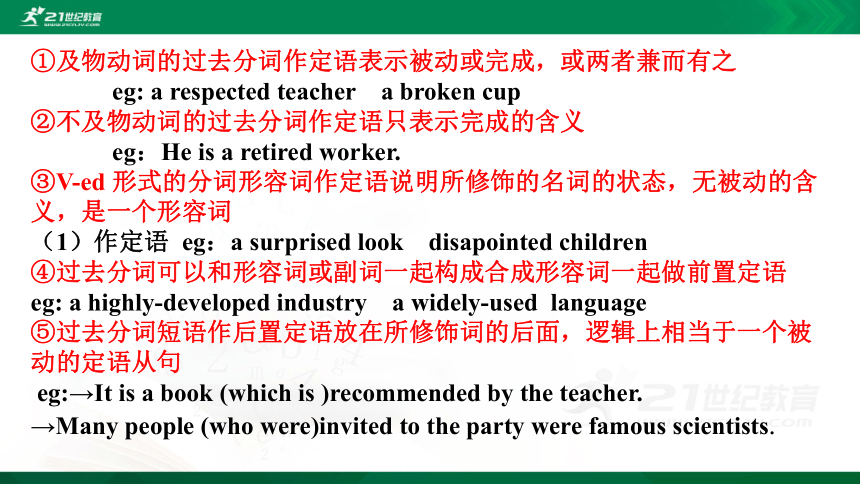
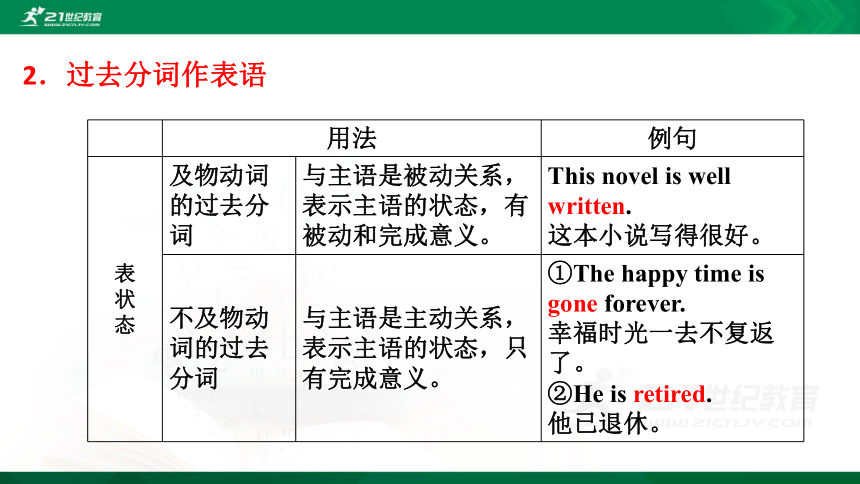
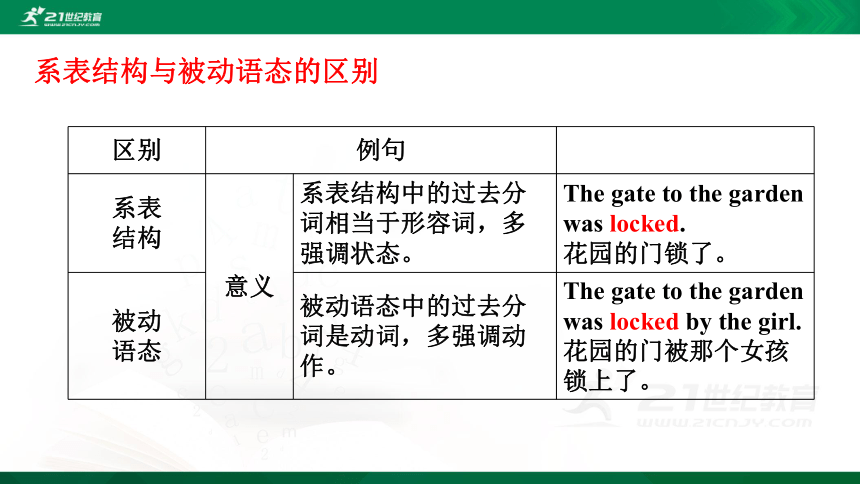
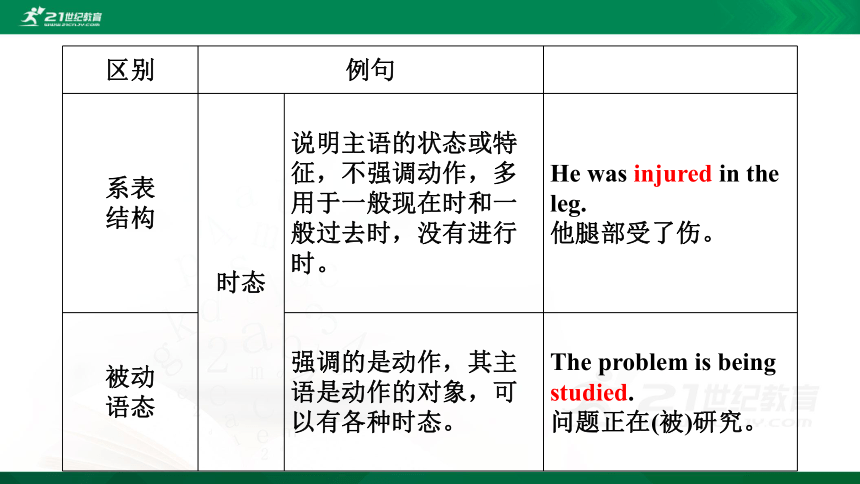
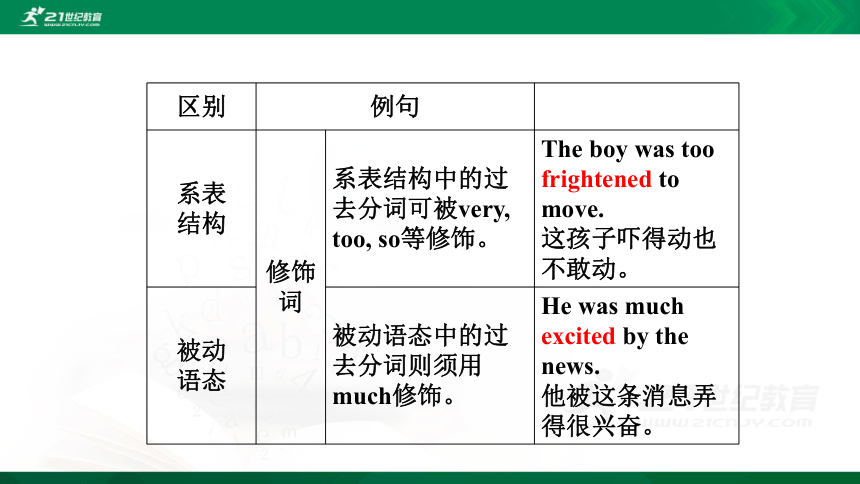
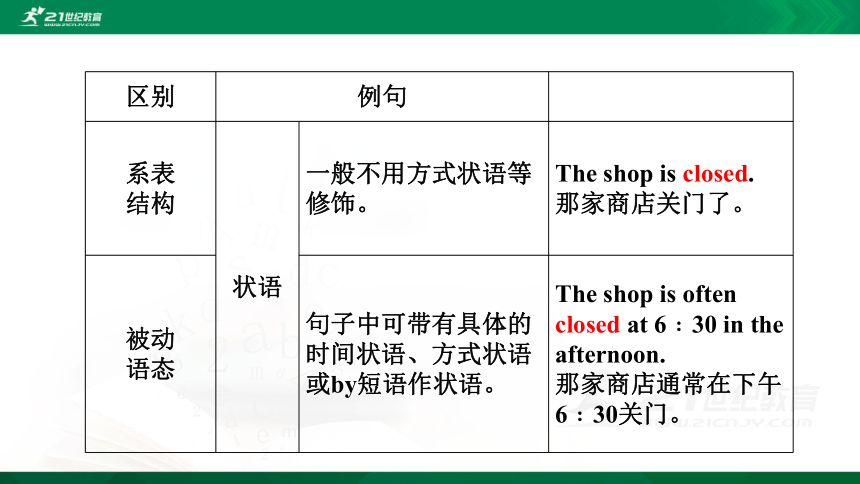
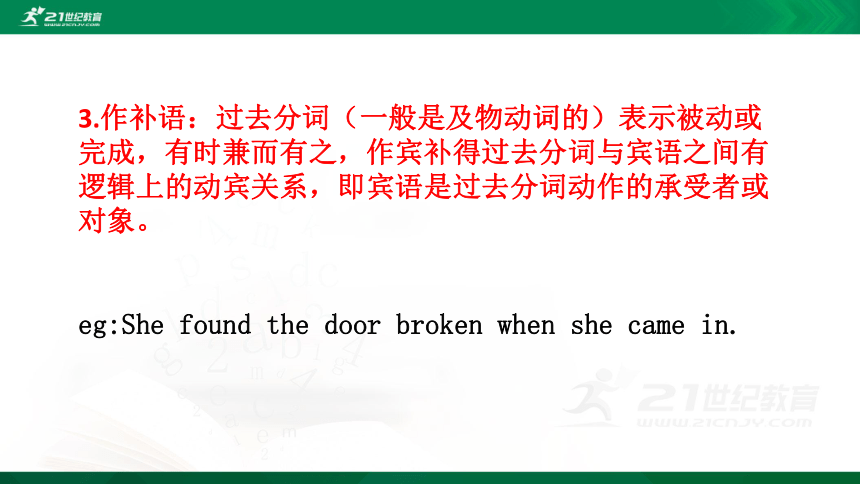
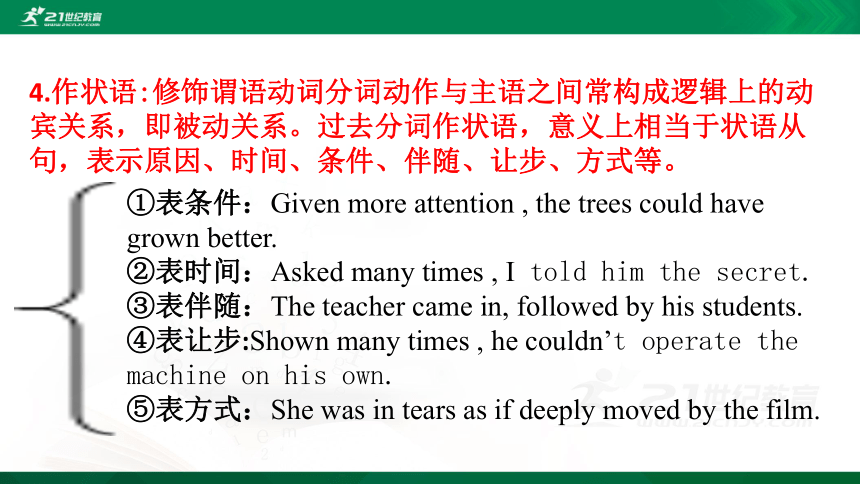
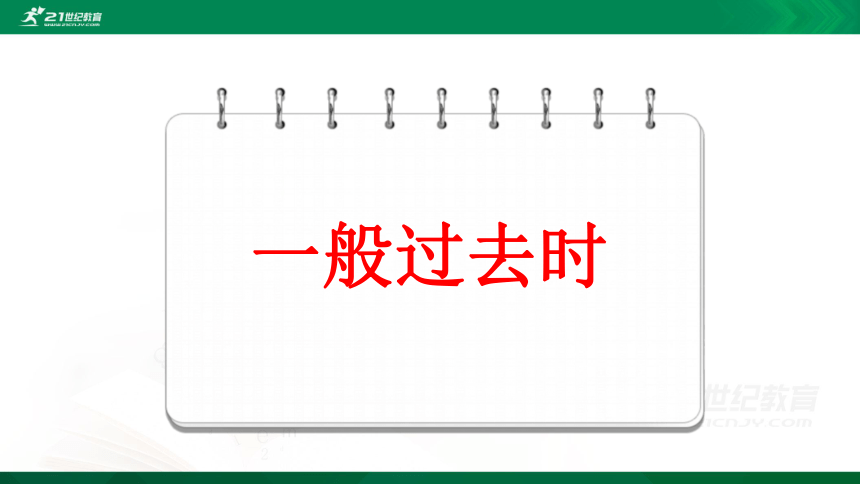
文档简介
(共50张PPT)
Module
Two
过去分词做定语,表语,补语,状语
时态(一般过去时/现在完成时/现在完成进行时)
必修一
图解语法助记
表解语法助记
动词的-ed形式
1.过去分词作定语
用法
例句
位
置
单个分词
前置
the
injured
workers受伤的工人
used
book用过的书
分词短语
后置
the
guests
invited
by
my
parents我父母邀请来的客人
a
book
written
by
Lu
Xun鲁迅写的一本书
意
义
及物动词的
过去分词
被动、完成
a
polluted
river
一条被污染了的河流
watered
flowers
浇过的花
不及物动词
的过去分词
完成
fallen
leaves落叶
a
retired
teacher一位退休教师
①及物动词的过去分词作定语表示被动或完成,或两者兼而有之
eg:
a
respected
teacher
a
broken
cup
②不及物动词的过去分词作定语只表示完成的含义
eg:He
is
a
retired
worker.
③V-ed
形式的分词形容词作定语说明所修饰的名词的状态,无被动的含义,是一个形容词
(1)作定语
eg:a
surprised
look
disapointed
children
④过去分词可以和形容词或副词一起构成合成形容词一起做前置定语
eg:
a
highly-developed
industry
a
widely-used
language
⑤过去分词短语作后置定语放在所修饰词的后面,逻辑上相当于一个被动的定语从句
eg:→It
is
a
book
(which
is
)recommended
by
the
teacher.
→Many
people
(who
were)invited
to
the
party
were
famous
scientists.
2.过去分词作表语
用法
例句
表
状
态
及物动词的过去分词
与主语是被动关系,表示主语的状态,有被动和完成意义。
This
novel
is
well
written.
这本小说写得很好。
不及物动词的过去分词
与主语是主动关系,表示主语的状态,只有完成意义。
①The
happy
time
is
gone
forever.
幸福时光一去不复返了。
②He
is
retired.
他已退休。
系表结构与被动语态的区别
区别
例句
系表
结构
意义
系表结构中的过去分词相当于形容词,多强调状态。
The
gate
to
the
garden
was
locked.
花园的门锁了。
被动
语态
被动语态中的过去分词是动词,多强调动作。
The
gate
to
the
garden
was
locked
by
the
girl.
花园的门被那个女孩锁上了。
区别
例句
系表
结构
时态
说明主语的状态或特征,不强调动作,多用于一般现在时和一般过去时,没有进行时。
He
was
injured
in
the
leg.
他腿部受了伤。
被动
语态
强调的是动作,其主语是动作的对象,可以有各种时态。
The
problem
is
being
studied.
问题正在(被)研究。
区别
例句
系表
结构
修饰词
系表结构中的过去分词可被very,
too,
so等修饰。
The
boy
was
too
frightened
to
move.
这孩子吓得动也不敢动。
被动
语态
被动语态中的过去分词则须用much修饰。
He
was
much
excited
by
the
news.
他被这条消息弄得很兴奋。
区别
例句
系表
结构
状语
一般不用方式状语等修饰。
The
shop
is
closed.
那家商店关门了。
被动
语态
句子中可带有具体的时间状语、方式状语或by短语作状语。
The
shop
is
often
closed
at
6﹕30
in
the
afternoon.
那家商店通常在下午
6﹕30关门。
3.作补语:过去分词(一般是及物动词的)表示被动或完成,有时兼而有之,作宾补得过去分词与宾语之间有逻辑上的动宾关系,即宾语是过去分词动作的承受者或对象。
eg:She
found
the
door
broken
when
she
came
in.
4.作状语:修饰谓语动词分词动作与主语之间常构成逻辑上的动宾关系,即被动关系。过去分词作状语,意义上相当于状语从句,表示原因、时间、条件、伴随、让步、方式等。
①表条件:Given
more
attention
,
the
trees
could
have
grown
better.
②表时间:Asked
many
times
,
I
told
him
the
secret.
③表伴随:The
teacher
came
in,
followed
by
his
students.
④表让步:Shown
many
times
,
he
couldn’t
operate
the
machine
on
his
own.
⑤表方式:She
was
in
tears
as
if
deeply
moved
by
the
film.
一般过去时
一般过去时的时间状语
一般过去时表示过去某个时间里发生的动作或某段时间内反复发生的动作及存在的状态,句子中常有标志性的时间状语。
时间状语
例句
表示过去发生的动作或存在的状态,常与yesterday\in
1996\two
years
ago\last
month\the
day
before
yesterday\the
other
day等表示过去的时间状语连用
1、The
great
wall
came
into
being
in
221B.C
2、She
suddenly
fell
ill
in
the
classroom
the
other
day.
3、Mr.
Jackson
came
to
china
a
score
of
years
ago.
4、A
thief
broke
into
his
house
and
stole
his
treasure
last
night.
一般过去时的时间状语
一般过去时表示过去某个时间里发生的动作或某段时间内反复发生的动作及存在的状态,句子中常有标志性的时间状语。
时间状语
例句
表示过去一段时间内经常或反复发生的行为,常与every
day\often\sometimes等时间状语连用,“used
to+动词原形”或“would+动词原形”常用来表示过去经常或反复发生的行为。
1、When
I
was
in
the
factory,
I
often
worked
in
the
workshop.
2、He
usually
came
to
school
by
bike
last
year.
3、We
used
to
get
up
at
five
every
morning
when
we
were
at
school.
4、We
would
ask
him
for
advice
when
we
had
trouble
with
our
English.
一般过去时的时间状语
一般过去时表示过去某个时间里发生的动作或某段时间内反复发生的动作及存在的状态,句子中常有标志性的时间状语。
时间状语
例句
表示过去发生的一连串动作。
The
professor
put
one
finger
in
his
mouth,
tasted
it,
and
smiled
with
satisfaction.
一般过去时的时间状语
一般过去时表示过去某个时间里发生的动作或某段时间内反复发生的动作及存在的状态,句子中常有标志性的时间状语。
时间状语
例句
在时间、条件、方式让步状语从句中用一般过去时表示过去将来的动作。
1、He
said
he
would
let
us
know
if
he
got
any
news.
2、He
promised
that
he
would
buy
some
copies
for
us
when
he
went
there.
3、She
said
she
would
write
to
us
soon
as
she
arrived
at
Beijing.
即学即用
语法填空
1.(2014·湖南,21,改编)Children,when________(accompany)by
their
parents,
are
allowed
to
enter
the
stadium.
答案:
accompanied 考查过去分词做状语。句意:当有父母陪伴时,孩子们才被允许进入体育馆。
2.________(use)
with
care,
one
tin
will
last
for
six
weeks.
答案:Used 本题考查非谓语动词作状语。句意:小心使用,一桶能持续六周。use与one
tin之间构成逻辑上的动宾关系,故用过去分词。
3.When
I
got
on
the
bus,I________(realize)I
had
left
my
wallet
at
home.
答案:realize 本题考查动词的时态。句意:当我上车后,我意识到我把钱包忘家里了。根据时态对应关系,此处应用一般过去时,表示“上车”和“意识到”这两个动作几乎同时发生。
Ⅰ.用所给词的适当形式填空,并观察在下列句子中所作的成分。
1.We
only
sell
________(use)
books.(
)
2.Mr.
Chen
is
an
_____________
(experience)
English
teacher.
(
)
3.The
________(steal)
bike
belongs
to
Jack.(
)
4.The
book
________(write)
by
Lu
Xun
made
a
deep
impression
on
us
readers.(
)
5.Is
there
anything
________
(plan)
for
the
weekend?
(
)
used
前置定语
experienced
前置定语
stolen
前置定语
written
后置定语
planned
后置定语
Ⅰ.用所给词的适当形式填空
1.When
your
________(speak)
English
gets
better,
so
will
your
________(write)
English.
2.Don't
you
know
the
girl
________(dress)
in
a
red
skirt?
3.The
________(injure)
workers
are
now
being
taken
good
care
of
in
the
hospital.
4.People
developed
a
kind
of
paper
________(make)
from
the
fibers
of
plants.
5.The
________(pollute)
air
is
bad
for
our
health.
spoken
written
dressed
injured
made
polluted
6.I
________(ring)
him
several
times
this
morning,
but
no
one
___________(answer)
the
phone.
7.—Nancy
is
not
coming
tonight.—But
she
________(say)
so.
8.When
I
was
young,
I
often
________(go)
to
swim
in
that
river.
9.A
big
fire
________(destroy)
the
whole
forest
last
year.
10.
He
always
________(have)
no
breakfast
during
that
year.
rang
answered
said
went
destroyed
had
Ⅱ.语法填空
1.The
foreign
guests,
________
by
a
translator,
came
out
of
the
meeting
hall.
答案:followed followed
by...作后置定语修饰guests,相当于定语从句who
were
followed
by...。
2.This
kind
of
animal,
________koala
bear,
can
be
found
only
in
Australia.
答案:called 这种动物被称作树袋熊,只有在澳大利亚才能够找到。“
________koala
bear”作后置定语修饰this
kind
of
animal,是被动关系,故用其过去分词形式。
3.He
was
among
the
three
candidates
________(interview)
for
the
job.
答案:interviewed 考查过去分词短语作后置定语。句意:他是3个来参加求职面试的人选之一。
4.—Why
are
you
looking
so
disappointed,
Ken?
—The
outdoor
concert
________
for
tomorrow
will
be
put
off.
答案:planned 首先根据plan与concert的被动关系,从时间上,“打算,计划”是已完成的事情,所以要用planned。句意:——“你为什么看起来那么沮丧,凯恩?”——“打算明天举行的露天音乐会将要推迟。”
5.The
judge
made
the
final
decision
after
listening
to
the
opinions
of
each
party
________.
答案:involved 句意:法官在听完当事人双方的意见后作出了最终判决。involved表示“参与,牵涉”,此处用过去分词短语作定语。
6.The
letter
Mary
had
looked
forward
to
________
her
last
night
and
she
was
very
excited.
答案:reached Mary
had
looked
forward
to作the
letter的定语,句子缺少的是谓语动语。根据时间状语last
night,故填reached。
7.(2015·北京卷,22改编)—Did
you
enjoy
the
party?
—Yes,We________(treat)
well
by
our
hosts.
答案:were
treated 由上文可知用一般过去时,再者我们是被招待,因此用被动式。
8.—Was
Mary
in
the
office
when
you
arrived
there?
—Yes,
but
she
________(leave)
soon
afterwards.
答案:left 句意:——“你到那里的时候玛丽在办公室吗?”——“在,但是之后她很快就离开了。”由问句时态及答语中的时间状语soon
afterwards判断,答语应用一般过去时。
9.Everyone
________
enjoying
music
when
there
was
a
knock
at
the
door.
答案:was 由when引导时间状语从句,时态要保持前后一致,故填was。
10.—It
is
so
late.
Why
must
you
ring
him
up
now?
—Oh,
sorry.
I
________(not
notice)
it.
答案:didn't
notice 句意:——“太晚了,为什么非得现在给他打电话呢?”——“哦,对不起,我刚才没有注意到时间。”“没有注意”这一动作是过去发生的,故用一般过去时态。
现在完成时
现在完成时的构成与用法
现在完成时由“have/has+动词的过去分词”构成。主要用来表示以下两个方面的含义:
用法
例句
1.表示过去发生或已经完成的某一动作对现在造成的影响或结果。
1、--Have
you
had
your
lunch
yet?
---Yes,
I
have.
I
have
just
had
it.(现在不饿了)
2、I
have
already
posted
the
parcel.(包裹已不在我这里)
用法
例句
2.表示过去已经开始,持续到现在的动作或状态,可以和表示从过去某一时刻延续到现在(包括“现在”在内)的一段时间内的状语连用:now\just\today\thismorning\thismonth\this
year\for\since\all
the
time
1、I
haven’t
seen
her
these
days(for
a
long
time).
2、Have
you
returned
the
book
today?
3、I’ve
known
Li
Lei
for
over
3
years.
since
he
came
here.
since
10
years
ago.
4、He
has
lived
here
since
1980\since
yesterday.
since
last
year.
ever
since(then).
用法
例句
3.与Already\never\ever\just\before\lately\recently\yet\so
far\up
to
the
present\up
till
now\in
the
past\last
few
years
等状语连用。
1、I
have
never
seen
such
an
inspiring
film
before.
2、Tom
has
done
his
homework
already.
3、I
haven’t
seen
him
so
far.
4、---Have
you
ever
been
to
Beijng?---NO
,I
have
never
been
there
5、Up
till
now
we
haven’t
seen
the
film.
4.与for\during\in\within\over引导的时间状语连用,表示从过去的某一行为一直延续到现在。
1、We
have
discussed
the
topic
(for)
the
last
3
week.
2、--Have
you
seen
any
Austrians
pass
by
here?
----Not
within
the
last
days.
3、I
haven’t
seen
him
in
the
recent
years.
用法
例句
5.表示反复或习惯性的动作,与several
times\once\twice\three
times\frequently等频度副词连用.
1、I
haven’t
watched
him
several
times.
2、He
has
been
to
London
twice.
3、I
have
seen
the
film
three
times.
6.在“最高级+名词”或在“这是第几次”之后跟定于从句,从句用现在完成时。
1、This
is
the
most
interesting
book
that
I
have
ever
read.
2、It
is
the
second
time
that
you
have
been
here.
3、This
is
the
first
time
that
I
have
visited
you
country.
用法
例句
7.表示从过去到现在没有发生的动作。
1、He
hasn’t
cleaned
the
room
for
10
days.
2、They
haven’t
heard
from
him
for
a
score
of
years.
8.用在时间、条件状语从句中,表示从句动作先于主句动作之前已完成。
1、I
will
give
my
opinion
after
I
have
read
through
the
book.
2、We’ll
set
out
at
once
if
the
rain
has
stopped.
3、I’ll
tell
him
after
you
have
left.
在现在完成时中,终止动词若于for\since等延续状语连用,需把终止动词变为be动词等的适当形式。如:
die—be
dead\
join-be
in\
fall
ill---be
ill\finish—be
over
\leave/
go—be
away
\begin—be
on
\make
friends—be
friends\
become-be\
get
ready-be
ready\buy—get/
have
\marry—be
married(to)
\
borrow—keep\
arrive
/get
to/reach/come—be
in
/be
at/
stay
\
dress—be(dressed)in\
put
on—have
on/wear
\meet—stay
together
1、He
arrived
in
China
in
1990\5
years
ago.
2、He
has
arrived
in
China.
3、he
has
been
in
china
since
1990\for
five
years.
4、It
is
5
years
since
he
(has)
arrived
in
china.
5.She
has
left
school
for
15
years.
ⅹ
She
has
been
away
from
school
for
15
years.
∨
6、
She
has
married
Jack
since
1965
。ⅹ
She
has
been
married
to
Jack
since
1965.
∨
7、
borrowed
the
novel
for
several
days.
ⅹ
I
have
Kept
the
novel
for
several
days.∨
8、
he
has
been
in
the
army
for
5
years.
∨
He
has
joined
the
army
for
5
years。
ⅹ
have/has
been
to与have/has
gone
to的区别
现在完成时与一般过去时的区别
现在完成进行时
用法
例句
表示过去某一时刻开始的动作一直延续到现在,甚至将来(强调进行的过程)
1、He
is
ill
.He
has
been
lying
in
bed
for
three
weeks.(动作会继续下去)
2、She
is
very
tired
.She
has
been
typing
letters
all
day.
3、Where
have
you
been?
He
has
been
waiting
for
you
all
this
morning.(动作刚刚结束)for
5
years。
一直到现在为止的一段时间内一再反复进行的动作。
1、All
these
years
they
have
been
contributing
articles
to
our
magazine.
2、Jim
has
been
phoning
Jenny
every
might
for
several
weeks.
即学即用
语法填空
1.His
first
novel________(receive)
good
reviews
since
it
came
out
last
month.
答案:has
received 考查时态。句意:他的第一部小说自从上月出版以来就得到了好评。含有since时间状语的句子中,主句用现在完成时。
2.—I
remember
you
were
a
talented
pianist
at
college.
Can
you
play
the
piano
for
me?
—Sorry,
I
________(play)
the
piano
for
years.
答案:haven't
played 考查时态的用法。答语意为:对不起,我不弹琴已经好多年了。故用现在完成时态。
3.(2015·北京卷,26改编)In
the
last
few
years,China________(make)
great
achievements
in
environmental
protection.
答案:has
made 考查现在完成时。当句中出现in/during
the
last/past+一般时间时,主句用现在完成时。
Ⅲ.语法填空
1.—Can
I
sit
at
the
table
near
the
window?
—I'm
sorry,
but
it
________(take)
already.
答案:has
been
taken 考查时态的具体运用。根据句意可知,那张桌子已经被占用了,因此用现在完成时,并且table与take为逻辑上的动宾关系,
因此用被动语态。
2.He
________(be)
Beijing,
so
he
knows
a
lot
about
it.
答案:has
been
to 考查现在完成时。“have
been
to+某地”,表示“曾经去过某地”;“have
gone
to+某地”表示“已经去某地了,还没回来或正在途中”。
3.—What
happened
to
the
saleswoman?
—We
don't
know.
She
________(not
see)
around
here
these
days.
答案:hasn't
been
seen 由句中these
days可以判断应用现在完成时,由语境知“她没有被看到”,故用现在完成时的被动语态。
4.—Have
you
called
120?
—Yes.
As
soon
as
I
saw
the
accident,
I
called
the
doctors,
but
they
________(not
arrive)
yet.
答案:haven't
arrived 根据句意可知,医生到现在为止还没来,因此用现在完成时。
5.He's
worked
on
the
farm
________two
years
ago.
答案:since “since+过去时间点”,
也可用“for+时间段”“for
two
years”与完成时连用。
6.I
hear
your
sister
________(be)
to
Japan
twice.
And
she
________(come)
back
last
week.
答案:has
been;
came “去过某地已回来”用has
been
to,第二个空last
week是一般过去时的时间状语,因此come用一般过去时。
7.Progress
________(be)
so
far
very
good
and
we
are
sure
that
the
work
will
be
finished
on
time.
答案:has
been 考查动词时态。so
far“至今”,是与现在完成时连用的时间状语。
8.This
information
will
be
less
________(confuse)
if
it's
produced
in
tabular
form.
答案:confusing confusing“令人困惑的;难懂的”,修饰事物;confused“感到困惑的,烦恼的”,修饰人。
9.If
you
want
to
see
the
play,you'll
have
to
queue
________
tickets.
答案:up
for queue
up
for“排队等候……”,为固定搭配。
10.—May
I
speak
to
your
manager
at
three
o'clock
tomorrow
afternoon?
—I'm
sorry.
He
________(fly)
to
Shanghai
by
then.
答案:will
have
flown 由句中的时间状语three
o'clock
tomorrow
afternoon,
by
then可知,此处表示到将来的某个时间已经完成的动作,故用将来完成时态。
谢谢
21世纪教育网(www.21cnjy.com)
中小学教育资源网站
有大把高质量资料?一线教师?一线教研员?
欢迎加入21世纪教育网教师合作团队!!月薪过万不是梦!!
详情请看:
https://www.21cnjy.com/help/help_extract.php
Module
Two
过去分词做定语,表语,补语,状语
时态(一般过去时/现在完成时/现在完成进行时)
必修一
图解语法助记
表解语法助记
动词的-ed形式
1.过去分词作定语
用法
例句
位
置
单个分词
前置
the
injured
workers受伤的工人
used
book用过的书
分词短语
后置
the
guests
invited
by
my
parents我父母邀请来的客人
a
book
written
by
Lu
Xun鲁迅写的一本书
意
义
及物动词的
过去分词
被动、完成
a
polluted
river
一条被污染了的河流
watered
flowers
浇过的花
不及物动词
的过去分词
完成
fallen
leaves落叶
a
retired
teacher一位退休教师
①及物动词的过去分词作定语表示被动或完成,或两者兼而有之
eg:
a
respected
teacher
a
broken
cup
②不及物动词的过去分词作定语只表示完成的含义
eg:He
is
a
retired
worker.
③V-ed
形式的分词形容词作定语说明所修饰的名词的状态,无被动的含义,是一个形容词
(1)作定语
eg:a
surprised
look
disapointed
children
④过去分词可以和形容词或副词一起构成合成形容词一起做前置定语
eg:
a
highly-developed
industry
a
widely-used
language
⑤过去分词短语作后置定语放在所修饰词的后面,逻辑上相当于一个被动的定语从句
eg:→It
is
a
book
(which
is
)recommended
by
the
teacher.
→Many
people
(who
were)invited
to
the
party
were
famous
scientists.
2.过去分词作表语
用法
例句
表
状
态
及物动词的过去分词
与主语是被动关系,表示主语的状态,有被动和完成意义。
This
novel
is
well
written.
这本小说写得很好。
不及物动词的过去分词
与主语是主动关系,表示主语的状态,只有完成意义。
①The
happy
time
is
gone
forever.
幸福时光一去不复返了。
②He
is
retired.
他已退休。
系表结构与被动语态的区别
区别
例句
系表
结构
意义
系表结构中的过去分词相当于形容词,多强调状态。
The
gate
to
the
garden
was
locked.
花园的门锁了。
被动
语态
被动语态中的过去分词是动词,多强调动作。
The
gate
to
the
garden
was
locked
by
the
girl.
花园的门被那个女孩锁上了。
区别
例句
系表
结构
时态
说明主语的状态或特征,不强调动作,多用于一般现在时和一般过去时,没有进行时。
He
was
injured
in
the
leg.
他腿部受了伤。
被动
语态
强调的是动作,其主语是动作的对象,可以有各种时态。
The
problem
is
being
studied.
问题正在(被)研究。
区别
例句
系表
结构
修饰词
系表结构中的过去分词可被very,
too,
so等修饰。
The
boy
was
too
frightened
to
move.
这孩子吓得动也不敢动。
被动
语态
被动语态中的过去分词则须用much修饰。
He
was
much
excited
by
the
news.
他被这条消息弄得很兴奋。
区别
例句
系表
结构
状语
一般不用方式状语等修饰。
The
shop
is
closed.
那家商店关门了。
被动
语态
句子中可带有具体的时间状语、方式状语或by短语作状语。
The
shop
is
often
closed
at
6﹕30
in
the
afternoon.
那家商店通常在下午
6﹕30关门。
3.作补语:过去分词(一般是及物动词的)表示被动或完成,有时兼而有之,作宾补得过去分词与宾语之间有逻辑上的动宾关系,即宾语是过去分词动作的承受者或对象。
eg:She
found
the
door
broken
when
she
came
in.
4.作状语:修饰谓语动词分词动作与主语之间常构成逻辑上的动宾关系,即被动关系。过去分词作状语,意义上相当于状语从句,表示原因、时间、条件、伴随、让步、方式等。
①表条件:Given
more
attention
,
the
trees
could
have
grown
better.
②表时间:Asked
many
times
,
I
told
him
the
secret.
③表伴随:The
teacher
came
in,
followed
by
his
students.
④表让步:Shown
many
times
,
he
couldn’t
operate
the
machine
on
his
own.
⑤表方式:She
was
in
tears
as
if
deeply
moved
by
the
film.
一般过去时
一般过去时的时间状语
一般过去时表示过去某个时间里发生的动作或某段时间内反复发生的动作及存在的状态,句子中常有标志性的时间状语。
时间状语
例句
表示过去发生的动作或存在的状态,常与yesterday\in
1996\two
years
ago\last
month\the
day
before
yesterday\the
other
day等表示过去的时间状语连用
1、The
great
wall
came
into
being
in
221B.C
2、She
suddenly
fell
ill
in
the
classroom
the
other
day.
3、Mr.
Jackson
came
to
china
a
score
of
years
ago.
4、A
thief
broke
into
his
house
and
stole
his
treasure
last
night.
一般过去时的时间状语
一般过去时表示过去某个时间里发生的动作或某段时间内反复发生的动作及存在的状态,句子中常有标志性的时间状语。
时间状语
例句
表示过去一段时间内经常或反复发生的行为,常与every
day\often\sometimes等时间状语连用,“used
to+动词原形”或“would+动词原形”常用来表示过去经常或反复发生的行为。
1、When
I
was
in
the
factory,
I
often
worked
in
the
workshop.
2、He
usually
came
to
school
by
bike
last
year.
3、We
used
to
get
up
at
five
every
morning
when
we
were
at
school.
4、We
would
ask
him
for
advice
when
we
had
trouble
with
our
English.
一般过去时的时间状语
一般过去时表示过去某个时间里发生的动作或某段时间内反复发生的动作及存在的状态,句子中常有标志性的时间状语。
时间状语
例句
表示过去发生的一连串动作。
The
professor
put
one
finger
in
his
mouth,
tasted
it,
and
smiled
with
satisfaction.
一般过去时的时间状语
一般过去时表示过去某个时间里发生的动作或某段时间内反复发生的动作及存在的状态,句子中常有标志性的时间状语。
时间状语
例句
在时间、条件、方式让步状语从句中用一般过去时表示过去将来的动作。
1、He
said
he
would
let
us
know
if
he
got
any
news.
2、He
promised
that
he
would
buy
some
copies
for
us
when
he
went
there.
3、She
said
she
would
write
to
us
soon
as
she
arrived
at
Beijing.
即学即用
语法填空
1.(2014·湖南,21,改编)Children,when________(accompany)by
their
parents,
are
allowed
to
enter
the
stadium.
答案:
accompanied 考查过去分词做状语。句意:当有父母陪伴时,孩子们才被允许进入体育馆。
2.________(use)
with
care,
one
tin
will
last
for
six
weeks.
答案:Used 本题考查非谓语动词作状语。句意:小心使用,一桶能持续六周。use与one
tin之间构成逻辑上的动宾关系,故用过去分词。
3.When
I
got
on
the
bus,I________(realize)I
had
left
my
wallet
at
home.
答案:realize 本题考查动词的时态。句意:当我上车后,我意识到我把钱包忘家里了。根据时态对应关系,此处应用一般过去时,表示“上车”和“意识到”这两个动作几乎同时发生。
Ⅰ.用所给词的适当形式填空,并观察在下列句子中所作的成分。
1.We
only
sell
________(use)
books.(
)
2.Mr.
Chen
is
an
_____________
(experience)
English
teacher.
(
)
3.The
________(steal)
bike
belongs
to
Jack.(
)
4.The
book
________(write)
by
Lu
Xun
made
a
deep
impression
on
us
readers.(
)
5.Is
there
anything
________
(plan)
for
the
weekend?
(
)
used
前置定语
experienced
前置定语
stolen
前置定语
written
后置定语
planned
后置定语
Ⅰ.用所给词的适当形式填空
1.When
your
________(speak)
English
gets
better,
so
will
your
________(write)
English.
2.Don't
you
know
the
girl
________(dress)
in
a
red
skirt?
3.The
________(injure)
workers
are
now
being
taken
good
care
of
in
the
hospital.
4.People
developed
a
kind
of
paper
________(make)
from
the
fibers
of
plants.
5.The
________(pollute)
air
is
bad
for
our
health.
spoken
written
dressed
injured
made
polluted
6.I
________(ring)
him
several
times
this
morning,
but
no
one
___________(answer)
the
phone.
7.—Nancy
is
not
coming
tonight.—But
she
________(say)
so.
8.When
I
was
young,
I
often
________(go)
to
swim
in
that
river.
9.A
big
fire
________(destroy)
the
whole
forest
last
year.
10.
He
always
________(have)
no
breakfast
during
that
year.
rang
answered
said
went
destroyed
had
Ⅱ.语法填空
1.The
foreign
guests,
________
by
a
translator,
came
out
of
the
meeting
hall.
答案:followed followed
by...作后置定语修饰guests,相当于定语从句who
were
followed
by...。
2.This
kind
of
animal,
________koala
bear,
can
be
found
only
in
Australia.
答案:called 这种动物被称作树袋熊,只有在澳大利亚才能够找到。“
________koala
bear”作后置定语修饰this
kind
of
animal,是被动关系,故用其过去分词形式。
3.He
was
among
the
three
candidates
________(interview)
for
the
job.
答案:interviewed 考查过去分词短语作后置定语。句意:他是3个来参加求职面试的人选之一。
4.—Why
are
you
looking
so
disappointed,
Ken?
—The
outdoor
concert
________
for
tomorrow
will
be
put
off.
答案:planned 首先根据plan与concert的被动关系,从时间上,“打算,计划”是已完成的事情,所以要用planned。句意:——“你为什么看起来那么沮丧,凯恩?”——“打算明天举行的露天音乐会将要推迟。”
5.The
judge
made
the
final
decision
after
listening
to
the
opinions
of
each
party
________.
答案:involved 句意:法官在听完当事人双方的意见后作出了最终判决。involved表示“参与,牵涉”,此处用过去分词短语作定语。
6.The
letter
Mary
had
looked
forward
to
________
her
last
night
and
she
was
very
excited.
答案:reached Mary
had
looked
forward
to作the
letter的定语,句子缺少的是谓语动语。根据时间状语last
night,故填reached。
7.(2015·北京卷,22改编)—Did
you
enjoy
the
party?
—Yes,We________(treat)
well
by
our
hosts.
答案:were
treated 由上文可知用一般过去时,再者我们是被招待,因此用被动式。
8.—Was
Mary
in
the
office
when
you
arrived
there?
—Yes,
but
she
________(leave)
soon
afterwards.
答案:left 句意:——“你到那里的时候玛丽在办公室吗?”——“在,但是之后她很快就离开了。”由问句时态及答语中的时间状语soon
afterwards判断,答语应用一般过去时。
9.Everyone
________
enjoying
music
when
there
was
a
knock
at
the
door.
答案:was 由when引导时间状语从句,时态要保持前后一致,故填was。
10.—It
is
so
late.
Why
must
you
ring
him
up
now?
—Oh,
sorry.
I
________(not
notice)
it.
答案:didn't
notice 句意:——“太晚了,为什么非得现在给他打电话呢?”——“哦,对不起,我刚才没有注意到时间。”“没有注意”这一动作是过去发生的,故用一般过去时态。
现在完成时
现在完成时的构成与用法
现在完成时由“have/has+动词的过去分词”构成。主要用来表示以下两个方面的含义:
用法
例句
1.表示过去发生或已经完成的某一动作对现在造成的影响或结果。
1、--Have
you
had
your
lunch
yet?
---Yes,
I
have.
I
have
just
had
it.(现在不饿了)
2、I
have
already
posted
the
parcel.(包裹已不在我这里)
用法
例句
2.表示过去已经开始,持续到现在的动作或状态,可以和表示从过去某一时刻延续到现在(包括“现在”在内)的一段时间内的状语连用:now\just\today\thismorning\thismonth\this
year\for\since\all
the
time
1、I
haven’t
seen
her
these
days(for
a
long
time).
2、Have
you
returned
the
book
today?
3、I’ve
known
Li
Lei
for
over
3
years.
since
he
came
here.
since
10
years
ago.
4、He
has
lived
here
since
1980\since
yesterday.
since
last
year.
ever
since(then).
用法
例句
3.与Already\never\ever\just\before\lately\recently\yet\so
far\up
to
the
present\up
till
now\in
the
past\last
few
years
等状语连用。
1、I
have
never
seen
such
an
inspiring
film
before.
2、Tom
has
done
his
homework
already.
3、I
haven’t
seen
him
so
far.
4、---Have
you
ever
been
to
Beijng?---NO
,I
have
never
been
there
5、Up
till
now
we
haven’t
seen
the
film.
4.与for\during\in\within\over引导的时间状语连用,表示从过去的某一行为一直延续到现在。
1、We
have
discussed
the
topic
(for)
the
last
3
week.
2、--Have
you
seen
any
Austrians
pass
by
here?
----Not
within
the
last
days.
3、I
haven’t
seen
him
in
the
recent
years.
用法
例句
5.表示反复或习惯性的动作,与several
times\once\twice\three
times\frequently等频度副词连用.
1、I
haven’t
watched
him
several
times.
2、He
has
been
to
London
twice.
3、I
have
seen
the
film
three
times.
6.在“最高级+名词”或在“这是第几次”之后跟定于从句,从句用现在完成时。
1、This
is
the
most
interesting
book
that
I
have
ever
read.
2、It
is
the
second
time
that
you
have
been
here.
3、This
is
the
first
time
that
I
have
visited
you
country.
用法
例句
7.表示从过去到现在没有发生的动作。
1、He
hasn’t
cleaned
the
room
for
10
days.
2、They
haven’t
heard
from
him
for
a
score
of
years.
8.用在时间、条件状语从句中,表示从句动作先于主句动作之前已完成。
1、I
will
give
my
opinion
after
I
have
read
through
the
book.
2、We’ll
set
out
at
once
if
the
rain
has
stopped.
3、I’ll
tell
him
after
you
have
left.
在现在完成时中,终止动词若于for\since等延续状语连用,需把终止动词变为be动词等的适当形式。如:
die—be
dead\
join-be
in\
fall
ill---be
ill\finish—be
over
\leave/
go—be
away
\begin—be
on
\make
friends—be
friends\
become-be\
get
ready-be
ready\buy—get/
have
\marry—be
married(to)
\
borrow—keep\
arrive
/get
to/reach/come—be
in
/be
at/
stay
\
dress—be(dressed)in\
put
on—have
on/wear
\meet—stay
together
1、He
arrived
in
China
in
1990\5
years
ago.
2、He
has
arrived
in
China.
3、he
has
been
in
china
since
1990\for
five
years.
4、It
is
5
years
since
he
(has)
arrived
in
china.
5.She
has
left
school
for
15
years.
ⅹ
She
has
been
away
from
school
for
15
years.
∨
6、
She
has
married
Jack
since
1965
。ⅹ
She
has
been
married
to
Jack
since
1965.
∨
7、
borrowed
the
novel
for
several
days.
ⅹ
I
have
Kept
the
novel
for
several
days.∨
8、
he
has
been
in
the
army
for
5
years.
∨
He
has
joined
the
army
for
5
years。
ⅹ
have/has
been
to与have/has
gone
to的区别
现在完成时与一般过去时的区别
现在完成进行时
用法
例句
表示过去某一时刻开始的动作一直延续到现在,甚至将来(强调进行的过程)
1、He
is
ill
.He
has
been
lying
in
bed
for
three
weeks.(动作会继续下去)
2、She
is
very
tired
.She
has
been
typing
letters
all
day.
3、Where
have
you
been?
He
has
been
waiting
for
you
all
this
morning.(动作刚刚结束)for
5
years。
一直到现在为止的一段时间内一再反复进行的动作。
1、All
these
years
they
have
been
contributing
articles
to
our
magazine.
2、Jim
has
been
phoning
Jenny
every
might
for
several
weeks.
即学即用
语法填空
1.His
first
novel________(receive)
good
reviews
since
it
came
out
last
month.
答案:has
received 考查时态。句意:他的第一部小说自从上月出版以来就得到了好评。含有since时间状语的句子中,主句用现在完成时。
2.—I
remember
you
were
a
talented
pianist
at
college.
Can
you
play
the
piano
for
me?
—Sorry,
I
________(play)
the
piano
for
years.
答案:haven't
played 考查时态的用法。答语意为:对不起,我不弹琴已经好多年了。故用现在完成时态。
3.(2015·北京卷,26改编)In
the
last
few
years,China________(make)
great
achievements
in
environmental
protection.
答案:has
made 考查现在完成时。当句中出现in/during
the
last/past+一般时间时,主句用现在完成时。
Ⅲ.语法填空
1.—Can
I
sit
at
the
table
near
the
window?
—I'm
sorry,
but
it
________(take)
already.
答案:has
been
taken 考查时态的具体运用。根据句意可知,那张桌子已经被占用了,因此用现在完成时,并且table与take为逻辑上的动宾关系,
因此用被动语态。
2.He
________(be)
Beijing,
so
he
knows
a
lot
about
it.
答案:has
been
to 考查现在完成时。“have
been
to+某地”,表示“曾经去过某地”;“have
gone
to+某地”表示“已经去某地了,还没回来或正在途中”。
3.—What
happened
to
the
saleswoman?
—We
don't
know.
She
________(not
see)
around
here
these
days.
答案:hasn't
been
seen 由句中these
days可以判断应用现在完成时,由语境知“她没有被看到”,故用现在完成时的被动语态。
4.—Have
you
called
120?
—Yes.
As
soon
as
I
saw
the
accident,
I
called
the
doctors,
but
they
________(not
arrive)
yet.
答案:haven't
arrived 根据句意可知,医生到现在为止还没来,因此用现在完成时。
5.He's
worked
on
the
farm
________two
years
ago.
答案:since “since+过去时间点”,
也可用“for+时间段”“for
two
years”与完成时连用。
6.I
hear
your
sister
________(be)
to
Japan
twice.
And
she
________(come)
back
last
week.
答案:has
been;
came “去过某地已回来”用has
been
to,第二个空last
week是一般过去时的时间状语,因此come用一般过去时。
7.Progress
________(be)
so
far
very
good
and
we
are
sure
that
the
work
will
be
finished
on
time.
答案:has
been 考查动词时态。so
far“至今”,是与现在完成时连用的时间状语。
8.This
information
will
be
less
________(confuse)
if
it's
produced
in
tabular
form.
答案:confusing confusing“令人困惑的;难懂的”,修饰事物;confused“感到困惑的,烦恼的”,修饰人。
9.If
you
want
to
see
the
play,you'll
have
to
queue
________
tickets.
答案:up
for queue
up
for“排队等候……”,为固定搭配。
10.—May
I
speak
to
your
manager
at
three
o'clock
tomorrow
afternoon?
—I'm
sorry.
He
________(fly)
to
Shanghai
by
then.
答案:will
have
flown 由句中的时间状语three
o'clock
tomorrow
afternoon,
by
then可知,此处表示到将来的某个时间已经完成的动作,故用将来完成时态。
谢谢
21世纪教育网(www.21cnjy.com)
中小学教育资源网站
有大把高质量资料?一线教师?一线教研员?
欢迎加入21世纪教育网教师合作团队!!月薪过万不是梦!!
详情请看:
https://www.21cnjy.com/help/help_extract.php
